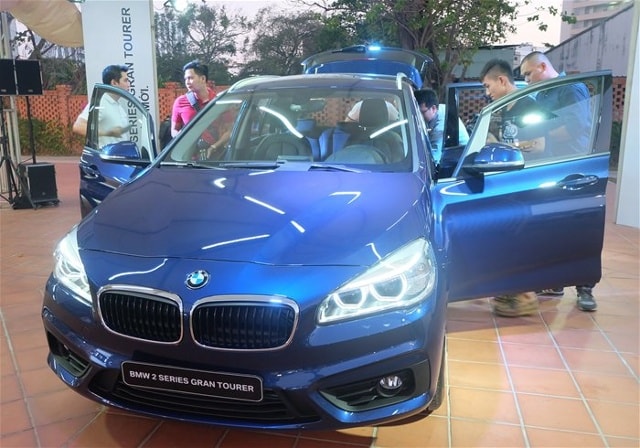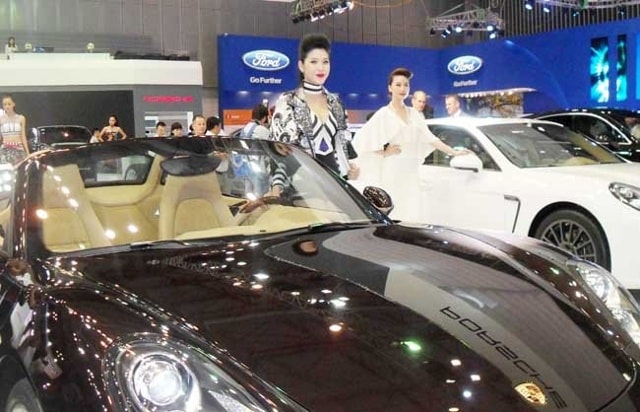Mass car price adjustment coming soon
It is likely that from July 1, a series of cars with cylinder capacity under 1.5L will have their prices adjusted down from 500 to 1,000 USD/car, while cars with cylinder capacity over 2.5L will be pushed up compared to current selling prices.
This is the opinion of the automobile business community after the National Assembly yesterday, April 6, passed a law amending and supplementing a number of articles of the Law on Special Consumption Tax (SCT), in which the SCT schedule for automobiles has many changes compared to the current tax rate and will take effect from July 1, 2016.
Cars under 1.5L... will be discounted
Specifically, for passenger cars with 9 seats or less and an engine capacity of less than 1,500 cm3 (1.5L), import tax will be reduced from the current 45% to 40% from July 1, then further reduced to 35% from January 1, 2018.
Thus, compared to the proposal to the National Assembly last November, the above reduction is only half. At that time, the proposal would reduce from 45% to 20-25% in 2018.
 |
| Euro Auto, anticipating the reduction of special consumption tax on cars under 1.5L, has introduced the 7-seat BMW 2 Series Gran Tourer with an engine under 1.5L. |
With a 5 percentage point reduction compared to the current tax rate, according to the business community, in principle, small car models currently on the market with cylinder capacity under 1.5L such as Hyundai i10, i 20; Kia Morning; Toyota Vios, Toyota Yaris; Honda City; Ford Fiesta, Ford Ecoboot; Chevrolet Spark, Suzuki Swift, Mazda 2... will have their prices reduced accordingly.
According to calculations by the business community, with a 5% reduction in special consumption tax, the price of these car models could decrease from 500 to 1,000 USD/depending on the type.
Currently, this car segment is considered to have a fairly fast growth rate and is occupying the largest market share in the domestic car market. Specifically, cars under 1.5 liters have increased their market share rapidly from 26.6% in 2011 to 36% in 2014 and are estimated to occupy 45-50% of the current car market share. These car models cost from 300 million to over 700 million VND/car, often used by young families, people who have just switched from motorbikes to cars, and a large number of taxi companies...
With the reduction of special consumption tax rates for small-capacity vehicles, businesses believe that this segment will continue to be vibrant in the coming time.
It is predicted that this segment will soon see the appearance of many new car models, with fierce competition between brands. In the near future, it is likely that not only popular car manufacturers but also luxury car brands will launch car models with cylinder capacity below 1.5L to gain market share as well as "take advantage" of this tax incentive.
For example, Euro Auto, the distributor and importer of luxury BMW cars in Vietnam, recently introduced to the domestic market for the first time the 7-seat BMW 2 Series Gran Tourer but with a capacity of less than 1.5L.
Mr. Tran Dang Thao, General Director of Euro Auto, also did not hide his intention to bring this 7-seat MPV with an engine under 1.5 L to Vietnam to anticipate the special consumption tax reduction policy for vehicles with engines under 1.5 L, which will be applied from next July. With a price of 1.5 billion VND, according to Mr. Thao, Euro Auto has also calculated a 5% special consumption tax reduction. "This is to encourage customers to register to buy a car right now, instead of waiting for another 3 months," said Mr. Thao.
And by 2018, when the special consumption tax continues to decrease by another 5 points for car models with engines of 1.5L or less, plus the import tax on these car models is 0-5% from the ASEAN region, the streets will likely be flooded with small-engine cars because the car prices at that time will be much lower than now.
However, for vehicles with a cylinder capacity of over 1,500 cm3 to 2,000 cm3, the National Assembly will maintain the current 45% special consumption tax rate until December 31, 2017, then reduce it to 40% from January 1, 2018. Vehicles with a cylinder capacity of over 2,000 cm3 to 2,500 cm3 will maintain the current 50% rate.
Thus, from now until the end of 2017, car models with cylinder capacity in this group will not be affected by the special consumption tax adjustment just approved by the National Assembly. According to the business community, this segment currently has the second highest car consumption.
 |
| Super luxury cars like Porsche will have to adjust prices sky high from the beginning of July. |
Luxury and super luxury car prices will be sky high
Taxes on small-capacity vehicles are reduced, but the National Assembly has decided to increase taxes on vehicles with cylinder capacities of over 2,500 cm3. Specifically, the special consumption tax rate applied to vehicles with cylinder capacities of over 2,500 cm3 to 3,000 cm3 will increase from the current 50% to 55% from July 1, 2016, then increase further to 60% from January 1, 2018.
Particularly for vehicles with a capacity of 3,000cc to over 6,000cc, the special consumption tax will be quite high, from 90% to 150% from July 1, while all of these vehicles currently have a common tax rate of 60%.
Specifically, vehicles with a capacity of 3.0 liters to 4.0 liters will be subject to a special consumption tax rate of 90%, an increase of 30 percentage points compared to the current rate. Vehicles with a capacity of 4.0 liters to 5.0 liters will be subject to a tax rate of 110%, an increase of 50 percentage points compared to the current rate. And vehicles with a capacity of 5.0 liters to 6.0 liters will be subject to a tax rate of 130%, an increase of 70 percentage points.
And for cars with a capacity of 6.0 liters or more, the special consumption tax rate is 150%, an increase of 90 percentage points, meaning 2.5 times higher than the current tax rate.
This is a record high level ever applied to automobiles, because the highest tax rate applied to this item was recorded as 100% for cars with less than 5 seats (applied in the period 1999-2003 according to the Special Consumption Tax Law issued in 1998).
Leaders of several domestic automobile assembly joint ventures also said that they have almost never seen any country impose a special consumption tax on automobiles of up to 150%.
The approval of this tax rate shows that the National Assembly agrees with the proposal of the Ministry of Industry and Trade to sharply increase the special consumption tax on luxury cars and reduce the tax to low for small cars when drafting the Prime Minister's decision on the policy to develop the automobile industry.
Currently, luxury cars over 3.0 liters only account for about 3% of the personal car market but their value is very large.
It is noteworthy that for luxury cars over 6.0L, when applying this new special consumption tax rate, the car price will be pushed up by at least 70% compared to the current price.
Most businesses anticipated the high increase in special consumption tax on luxury cars over 3.0L because the proposal on this tax rate by the Ministry of Industry and Trade had been widely reported in the media in recent times.
Talking to TBKTSG Online about the high excise tax on luxury cars as mentioned above, many car dealers predict that the consumption market for these car lines will decrease significantly in the near future.
Previously, when the Ministry of Industry and Trade proposed this tax rate, many opinions also said that if the tax was too high, no one would buy cars. If no one bought or sold, the State would not collect any more tax. At that time, analysts said that the significance of sharply increasing taxes on cars with a capacity of over 3.0 liters to reduce trade deficit and increase budget revenue was not great. The market share of this car segment is currently too small. With this high tax increase, no one would import cars and therefore, although it was thought to increase revenue, it ended up losing budget revenue.
(According to TBKTSG)
| RELATED NEWS |
|---|

